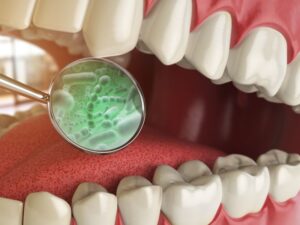Our Westerville dental office is in the same general location as the Westerville Community Center, on County Line Rd W between Africa Rd and N Cleveland Ave. We’re also less than five minutes west of N State Street.

More than 90% of people develop a dental cavity at some point in their lives. Have you ever wondered exactly how cavities form? Often, people blame this problem on sugar, but sugar does not actually cause decay. Rather, it interacts with bacteria in the mouth, which then cause cavities. Which specific species of bacteria are responsible for cavity formation? This blog post talks about streptococcus mutans and a newly discovered species, selenomonas sputigena. They work together to harm your oral health.
How Bacteria Cause Cavities
In the past, it was believed that streptococcus mutans was primarily responsible for tooth decay. When it feeds on sugars and starches, it creates plaque, an acidic biofilm that is harmful for teeth. The longer plaque remains on the teeth, the greater the risk that it will harden into tartar, which is not possible to remove with at-home oral hygiene instruments. Eventually, small holes (cavities) form in the tooth enamel.
Yes, streptococcus mutans plays a large role in tooth decay, but a recent study has shed new light on the process that leads to cavities. Collaboration between researchers from the University of Pennsylvania School of Dental Medicine and the Adams School of Dentistry and Gillings School of Global Public Health at the University of North Carolina has led to the discovery of a new bacterial species: selenomonas sputigena.
The researchers do not believe that selenomonas sputigena actually causes tooth decay. Rather, it increases the cavity-causing power of streptococcus mutans. It does so by forming honeycomb-shaped structures within plaque that protect and encapsulate streptococcus mutans, thereby increasing acid production.
What Does the Research Mean?
The above information is fascinating, yes, but does it have any practical value? Indeed, it does. As scientists deepen their understanding of how cavities form, they may be in a better position to prevent tooth decay in patients of all ages. Of course, years of research may still be necessary before this information can be put to use on a widespread basis.
In the meantime, it is up to each individual to do what they can to prevent cavities. For example, you should thoroughly brush your teeth and floss in order to prevent bacteria accumulation. It would also be wise to consume sugars and starches only in moderation.
The mouth is a remarkable environment! Learning about its microbiome may just enhance your appreciation for your smile.
Meet the Practice
Drs. Tzagournis, Walton, and Bell are proud to provide patients in the Westerville community with top-quality oral health care. If you would like advice on how to prevent cavities, or you suspect you need treatment for spots of decay that already exist, our team is ready to serve you. Contact our office at 614-882-4032.





